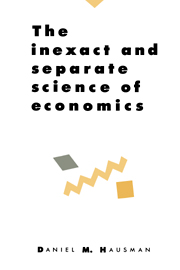Part III - Conclusion
Published online by Cambridge University Press: 04 August 2010
Summary
Part I explored the structure and strategy of neoclassical economics, that is – or so I argued – of equilibrium theory and its applications, while part II addressed the problems of theory assessment in economics and showed how these can be clarified by the conclusions of part I. What is philosophically distinctive about economics is not the view of theory assessment accepted by economists but the structure and strategy of economic theorizing. The problems that have been addressed are central to the practice of economists, to epistemological problems of interest to philosophers of social science, and to the attitudes of philosophers, economists, politicians, and others toward the discipline of economics and the conclusions it defends.
Although I have emphasized the vision of economics as a separate science as the key to its methodological peculiarities, this book has defended many detailed theses, and I shall summarize the most important of these in chapter 15. Much of what I have written can be regarded as a defense of puzzling features of neoclassical economics. For I have maintained that the ‘obvious falsehoods’ upon which economic theory depends can be regarded as qualified truths and can be justifiably accepted and employed in some contexts. Along the way I have criticized both general philosophical views that would condemn such theorizing, and specific accounts of economic methodology such as those defended by Hutchison, Samuelson, Machlup, and Friedman.
- Type
- Chapter
- Information
- The Inexact and Separate Science of Economics , pp. 245 - 246Publisher: Cambridge University PressPrint publication year: 1992



